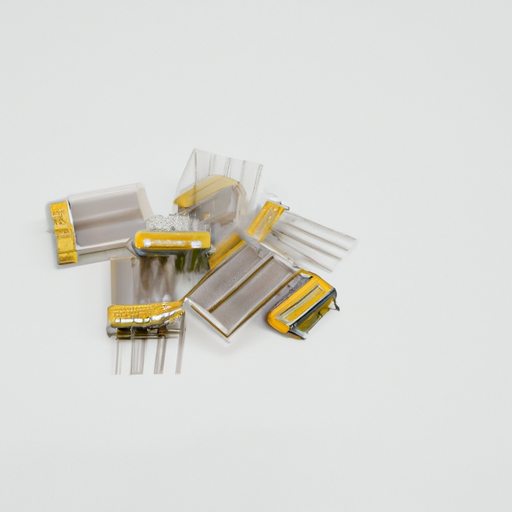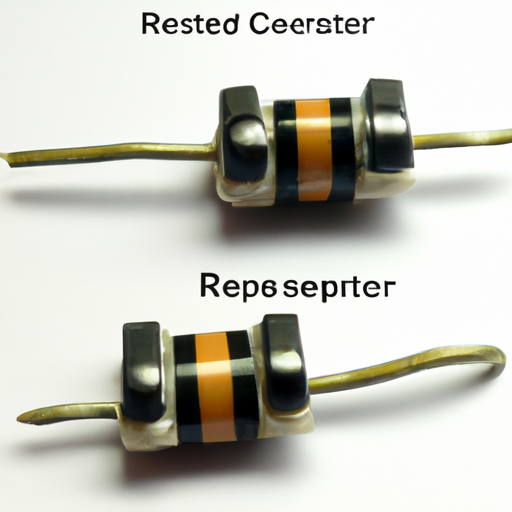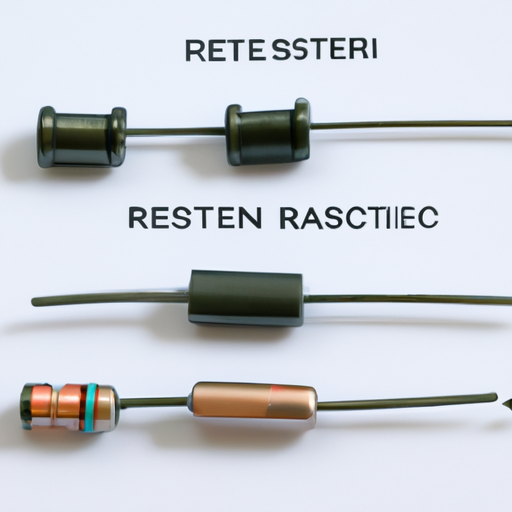What industries are the application scenarios of fuse resistors included?
What Industries Are the Application Scenarios of Fuse Resistors Included?
I. Introduction
In the realm of electrical engineering, fuse resistors play a pivotal role in ensuring the safety and efficiency of electrical circuits. These components are designed to protect sensitive electronic devices from overcurrent situations, thereby preventing damage and ensuring longevity. This blog post aims to explore the various industries that utilize fuse resistors, highlighting their application scenarios and the significance of these components in modern technology.
II. Understanding Fuse Resistors
A. Explanation of Fuse Resistors
Fuse resistors are specialized components that combine the functions of a resistor and a fuse. They are designed to limit current flow while also providing overcurrent protection. When the current exceeds a predetermined threshold, the fuse resistor will "blow," effectively interrupting the circuit and preventing further damage.
1. Functionality
The primary function of fuse resistors is to protect electronic circuits from excessive current. They act as a safeguard, ensuring that if a fault occurs, the resistor will fail before any other critical components are damaged.
2. Construction
Typically, fuse resistors are constructed using materials that can withstand high temperatures and electrical stress. They may be made from wirewound, thick film, or thin film technologies, each offering unique benefits depending on the application.
B. Types of Fuse Resistors
1. Wirewound Fuse Resistors
These resistors are made by winding a metal wire around a ceramic core. They are known for their high power ratings and stability, making them suitable for high-performance applications.
2. Thick Film Fuse Resistors
Thick film fuse resistors are created by applying a thick layer of resistive material onto a substrate. They are compact and cost-effective, making them popular in consumer electronics.
3. Thin Film Fuse Resistors
Thin film fuse resistors are made by depositing a thin layer of resistive material. They offer high precision and stability, making them ideal for applications requiring tight tolerances.
C. Key Characteristics
1. Resistance Value
The resistance value of a fuse resistor is crucial as it determines the current flow in the circuit. Selecting the appropriate resistance value is essential for effective circuit protection.
2. Power Rating
The power rating indicates the maximum power the resistor can handle before failing. It is vital to choose a fuse resistor with a power rating that matches the application's requirements.
3. Temperature Coefficient
The temperature coefficient measures how the resistance changes with temperature. A low temperature coefficient is desirable for applications requiring stable performance across varying temperatures.
III. Key Industries Utilizing Fuse Resistors
A. Consumer Electronics
In the consumer electronics sector, fuse resistors are widely used in devices such as smartphones, tablets, and home appliances. They protect sensitive components from overcurrent situations, ensuring device reliability and safety.
1. Application in Smartphones and Tablets
Smartphones and tablets contain numerous delicate components that can be easily damaged by excessive current. Fuse resistors help safeguard these devices, enhancing their durability and performance.
2. Use in Home Appliances
Home appliances, such as microwaves and washing machines, also benefit from fuse resistors. They provide essential protection against electrical faults, ensuring safe operation.
B. Automotive Industry
The automotive industry has increasingly adopted fuse resistors, particularly in electric vehicles (EVs) and traditional vehicles. They play a crucial role in enhancing safety features and ensuring the reliability of electrical systems.
1. Role in Electric Vehicles
In electric vehicles, fuse resistors are essential for managing the high currents associated with battery systems. They help prevent overcurrent situations that could lead to battery damage or failure.
2. Safety Features in Traditional Vehicles
In traditional vehicles, fuse resistors are used in various safety systems, including airbags and anti-lock braking systems (ABS). They ensure that these critical systems function correctly, enhancing overall vehicle safety.
C. Telecommunications
The telecommunications industry relies heavily on fuse resistors to maintain signal integrity and protect network equipment.
1. Use in Network Equipment
Fuse resistors are used in routers, switches, and other network devices to prevent damage from power surges and overcurrent situations. This protection is vital for maintaining reliable communication networks.
2. Importance in Signal Integrity
In telecommunications, maintaining signal integrity is crucial. Fuse resistors help ensure that signals remain stable and free from interference, enhancing overall system performance.
D. Industrial Automation
In industrial automation, fuse resistors are employed in robotics and control systems to ensure safe and efficient operation.
1. Application in Robotics
Robots often operate in environments where electrical faults can occur. Fuse resistors provide essential protection, allowing robots to function safely and reliably.
2. Use in Control Systems
Control systems in industrial settings rely on fuse resistors to protect sensitive components from overcurrent situations, ensuring smooth operation and minimizing downtime.
E. Medical Devices
The medical industry places a high premium on safety and reliability, making fuse resistors essential in various medical devices.
1. Importance in Diagnostic Equipment
Diagnostic equipment, such as MRI machines and ultrasound devices, requires precise operation. Fuse resistors help protect these devices from electrical faults, ensuring accurate results.
2. Role in Patient Monitoring Systems
Patient monitoring systems rely on fuse resistors to maintain functionality and safety. They help prevent overcurrent situations that could compromise patient care.
F. Renewable Energy
The renewable energy sector has seen significant growth, with fuse resistors playing a vital role in solar inverters and wind turbines.
1. Application in Solar Inverters
Solar inverters convert DC power from solar panels into AC power for use in homes and businesses. Fuse resistors help protect these systems from overcurrent situations, ensuring efficient operation.
2. Use in Wind Turbines
In wind turbines, fuse resistors are used to protect electrical systems from surges and faults, ensuring reliable energy production.
G. Aerospace and Defense
The aerospace and defense industries require the highest levels of reliability and safety, making fuse resistors indispensable.
1. Role in Avionics
Avionics systems in aircraft rely on fuse resistors to protect sensitive electronic components from overcurrent situations, ensuring safe flight operations.
2. Use in Military Equipment
Military equipment often operates in harsh environments where electrical faults can occur. Fuse resistors provide essential protection, ensuring the reliability of critical systems.
IV. Application Scenarios of Fuse Resistors
A. Overcurrent Protection
1. Explanation of Overcurrent Situations
Overcurrent situations can occur due to various factors, including short circuits, equipment malfunctions, or unexpected load increases. These situations can lead to severe damage if not addressed promptly.
2. How Fuse Resistors Provide Protection
Fuse resistors are designed to "blow" when the current exceeds a certain threshold, interrupting the circuit and preventing further damage. This protective mechanism is crucial in safeguarding electronic devices.
B. Voltage Regulation
1. Importance of Voltage Stability
Voltage stability is essential for the proper functioning of electronic devices. Fluctuations in voltage can lead to malfunctions or damage.
2. Role of Fuse Resistors in Regulation
Fuse resistors help maintain voltage stability by limiting current flow and preventing overcurrent situations, ensuring that devices operate within their specified voltage ranges.
C. Signal Conditioning
1. Explanation of Signal Integrity
Signal integrity refers to the quality of an electrical signal as it travels through a circuit. Maintaining signal integrity is crucial for the proper functioning of electronic devices.
2. Use of Fuse Resistors in Signal Processing
Fuse resistors help maintain signal integrity by preventing overcurrent situations that could distort signals, ensuring accurate data transmission.
D. Thermal Management
1. Importance of Heat Dissipation
Excessive heat can lead to component failure and reduced performance. Effective thermal management is essential for the longevity of electronic devices.
2. How Fuse Resistors Aid in Thermal Management
Fuse resistors dissipate heat generated during operation, helping to maintain optimal temperatures and prevent overheating.
V. Advantages of Using Fuse Resistors
A. Enhanced Safety Features
Fuse resistors provide an added layer of safety by protecting electronic devices from overcurrent situations, reducing the risk of damage and failure.
B. Compact Design
The compact design of fuse resistors makes them suitable for various applications, including space-constrained environments.
C. Cost-Effectiveness
Fuse resistors are often more cost-effective than other protective components, making them an attractive option for manufacturers.
D. Versatility in Applications
Fuse resistors can be used in a wide range of industries and applications, making them a versatile choice for engineers and designers.
VI. Challenges and Considerations
A. Limitations of Fuse Resistors
While fuse resistors offer numerous benefits, they also have limitations, including potential failure modes and the need for careful selection based on application requirements.
B. Factors Influencing Selection
1. Environmental Conditions
Environmental conditions, such as temperature and humidity, can impact the performance of fuse resistors. It is essential to consider these factors when selecting components.
2. Load Requirements
Understanding the load requirements of a specific application is crucial for selecting the appropriate fuse resistor to ensure optimal performance.
C. Future Trends in Fuse Resistor Technology
As technology continues to evolve, advancements in fuse resistor technology are expected, including improved materials and designs that enhance performance and reliability.
VII. Conclusion
In conclusion, fuse resistors play a vital role across various industries, providing essential protection and enhancing the reliability of electronic devices. From consumer electronics to aerospace and defense, these components are integral to modern technology. As we look to the future, the continued development of fuse resistor technology will undoubtedly lead to even more innovative applications and improved safety features.
VIII. References
- Academic Journals
- Industry Reports
- Manufacturer Specifications and Guidelines
This comprehensive exploration of fuse resistors highlights their significance in various industries and application scenarios, emphasizing their role in ensuring safety and reliability in modern technology.






